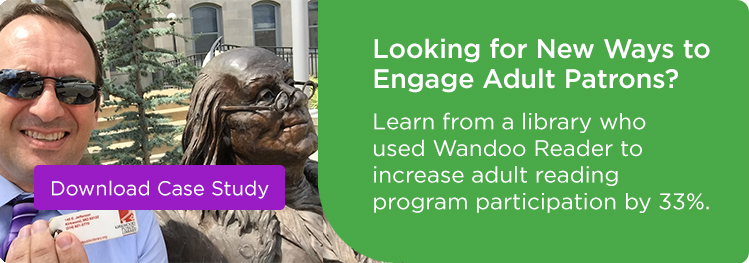
5 Ways to Engage Adults With Your Library’s Reading Programs
Adult summer reading programs benefit patrons of all ages, as well as your library. When children witness their role models reading, they’re much more likely to become avid readers themselves. Adults who participate in summer reading programs are more likely to take advantage of the library’s resources and services year-round. And, since they have firsthand experience with the value the library offers the community, they’re much more likely to vote to increase the local funding that makes your events and programs possible.
Unfortunately, many libraries still see lower levels of engagement with their adult program than their children’s program. One of the main reasons that adult summer reading programs often have low participation is a lack of awareness around this programming. To help draw attention to this valuable service that you offer, we’ve compiled five ways that your library can create and market an adult summer reading program that captures — and keeps — the attention of your older patrons.
1. Encourage a Healthy Sense of Competition
The Olympics, the Super Bowl, March Madness — do you know what these three popular events have in common? They capture attention because they inspire a healthy sense of competition! A similar approach can help you boost participation in your adult summer reading program.
First, be sure that you offer many different ways to earn points beyond just reading books. You’ll also want to display prizes prominently to remind patrons of what they’re working toward with each activity they complete. If you use Wandoo Reader, it’s easy to create Challenges, or literacy and learning activities, that are creative. Try the following:
- Encourage patrons to try out unique resources, like your makerspace or your online brain training program, for points.
- Challenge patrons to attend at least three events (rather than just one) to be entered to win a grand prize like a $100 gas gift card or an Amazon Kindle.
- Invite patrons to an after-hours event that is similar to an event they might pay to attend if it weren’t offered by the library: a movie night with popcorn, a book reading with author meet-and-greet or a multicultural food festival.
Once you have your Challenges and prizes set, establish your teams. You can invite competition among community groups, local businesses, neighborhoods, library branches — any group that shares a common characteristic will work. Get staff in on the fun as well by offering a prize for the staff member who signs up the greatest number of participants. The key here is ensuring that your teams know they’re working together toward a common goal, so send out press releases, post on social media and have staff remind patrons at the circulation desk about prizes and the goals that you’ve set for their teams.
2. Partner Up to Promote
Consider reaching out to local organizations that can act as your promotional partners. Your library may already work with schools and child care facilities to get children involved in your youth-focused summer reading programs, but these are also great places to start when it comes to getting parents and other caregivers involved in your adult program. After all, adults are the ones bringing children to these community spots.
To raise awareness of its adult summer reading program, Kirkwood Public Library (MO) sent a mobile lending library to the local pool, where they inserted summer reading program flyers in all of their books. Take a page from Kirkwood’s book and consider advertising in locations where adults spend time, such as waiting rooms, coffee shops, cafes, and community and senior centers. You can get creative within the library, too; Kirkwood included promotional pieces for their adult summer reading program in all books that were placed on hold as well.
You can also turn to your community partners who have donated prizes. Make it clear when you establish the partnership that their business will receive valuable exposure in all your marketing materials. Ask in return that they help you promote your program by making your reading program information available to their customers, whether it’s at the floral shop, a boutique or restaurant.
3. Make Participation Valuable and Easy
To encourage adult participation in your summer reading program, make it worth patrons’ while to participate. Many libraries boost participation by offering gift cards to local restaurants (everyone loves free food!) or stores for reaching program milestones, but you’re not limited by the prizes that your community partners can donate. Also consider the following:
- Offer fine forgiveness to summer reading program participants if they reach an ambitious community reading goal.
- Throw a party at a local water park, mini-golf course, bowling alley or other family-friendly place for parents and their children who reach a family reading goal.
- Partner with your Friends of the Library organization to donate to a local nonprofit if participants reach a certain goal.
- Collaborate with local museums, theme parks or botanical gardens to offer free daily passes for checkout to those who sign up for your program.
Finding ways to simplify participation and remove the necessity for visiting a physical branch can also help increase participation. Kirkwood Public Library eliminated the requirement for participants to have a library card. This allowed even more adults, especially those who couldn’t easily access the physical library, to participate. As an added bonus, by joining the summer reading program, non-cardholders are encouraged to sign up for library cards.
Kirkwood also uses Wandoo Reader’s Challenges feature to drive adult participation. These literacy-promoting activities can be tracked by participants online, and they include easy-to-complete, fun tasks such as submitting a book review; taking a picture of a favorite reading spot; or reading a book featuring someone of a different race, gender, sexuality or nationality than their own.
4. Target Your Programming
Adding compelling adult programming to your library’s summer calendar can be a good way to keep adults hooked on your summer reading program. Whether it’s Zumba, crafting, genealogy, book discussions or writing workshops, your options are limited only by the interests of your community. Keep timing in mind as well. Hosting adult programs at the same time and location as children’s programs will help boost parent attendance.
Don’t limit your programming to inside your library’s walls. If you use an online reading program management tool like Wandoo Reader, activities in your adult summer reading program can include not just attending branch events, but also completing community-based Challenges, such as giving a book to someone, performing an act of kindness, visiting a community space or talking about a book with others.
5. Make Your Program Inclusive
There are many adults who, for a variety of reasons, may find it difficult to fulfill your program’s reading requirements. To ensure your program is inclusive, emphasize that readers can track alternative formats, such as audio and large-print books. Promoting books written in all of the languages that are spoken in your community, rather than just English, can help boost participation as well.
Looking for more ways to pique interest in your adult summer reading program? Learn more about how Kirkwood Public Library boosted adult engagement with their summer reading program using Wandoo Reader in this case study.
Sources
“Adult Summer Reading Suggested Activities,” Kansas City Public Library
“How to Design Library Programming That Reaches Millennials and Generation X,” Demco
“Outcome- and Outreach-Based Summer Reading: Adults,” California Library Association’s Summer at Your Library
“Youth Services Best Practices for Oregon Libraries,” Oregon State Library




